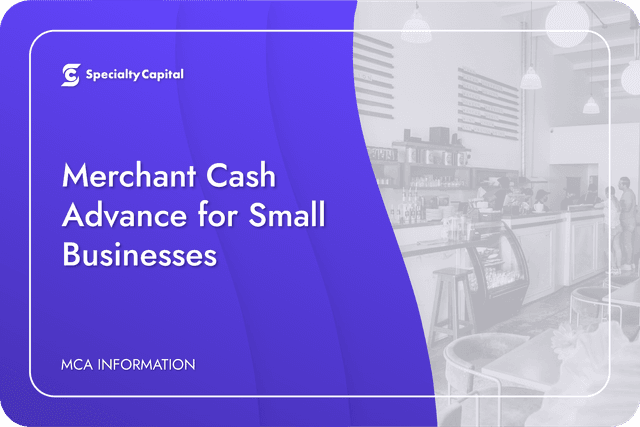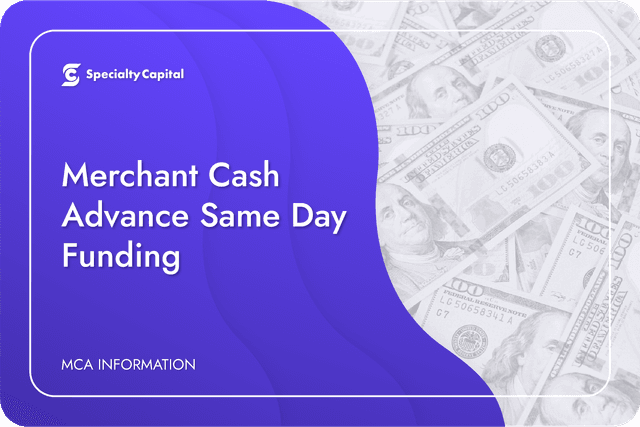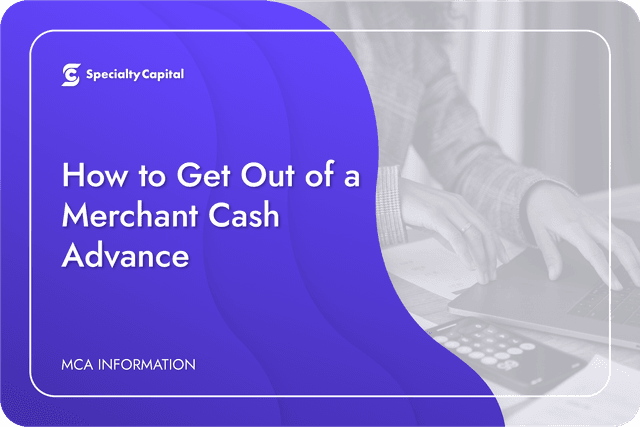If your business needs capital to grow, a merchant cash advance can be an excellent option to secure financing for your small business. However, just like any type of business financing, there are some pros and cons that should be considered. In this guide, we’ll help you weigh the pros and cons of a merchant cash advance to help you decide if it’s the best option for your business.
One of the biggest benefits of a merchant cash advance is the more lenient requirements to be approved. When compared to a traditional business loan, a merchant cash advance can be much simpler to get approved for because it relies on business revenue instead of credit scores, collateral, and history. This means if you have less-than-perfect credit – you can still get approved for an MCA in many cases.
The crux of your approval is based on your business’s card sales. As a rule of thumb, most funders will finance between 80% and 120% of your monthly card sales. For example, if your business generates $100,000 of card sales each month – most funders can approve you for up to $120,000 of financing.
The exact requirements will vary from funder to funder, so you can check with multiple MCA providers to understand their eligibility requirements.
Another huge benefit of a merchant cash advance is the speed at which they can be funded. Because of the more lenient approval process and reduced regulation, you can often get access to capital within a couple of weeks, whereas some traditional loans can take months to secure. This will depend on your funder and your business specifics, but it’s possible to get access to cash within weeks.
Because your future card sales are being used as collateral for the financing, you don’t need additional collateral or assets to be approved. This can be a great benefit for businesses that lack physical assets to get approved for other types of financing.
For example, with most bank loans and other forms of financing, you’ll need some collateral, such as inventory, real estate, or other assets to be approved for the financing. With an MCA, you won’t need these assets, which makes them more accessible to small business owners who don’t have other assets to secure funding.
Additionally, the lack of collateral also helps to expedite the funding process because there is no appraisal involved to validate your asset’s worth.
The remittance terms for a merchant cash advance can be another pro that makes them attractive for small business owners looking for capital. Because the amount you remittance each month is tied to your revenue and card sales, it lessens the chances of being underwater on your financing.
In most cases, the remittance amount will be a percentage of your daily or weekly card sales. For example, you may agree to remit back 10% of your weekly debit and credit card sales towards your MCA. If your business generates $25,000 in weekly card sales, your remittance amount would be $2,500. However, if your business only generates $10,000 in a week, your remittance for that week would equate to $1,000. The flexible remittance terms can help to keep your business remain profitable even during slower seasons.
Some funders, like Specialty Capital, offer lucrative prepayment discounts that can lower the total cost of your financing. This can be a great option for businesses that are strapped for cash in the short term but don’t want to pay an exorbitant amount in financing costs.
For example, if your business is awaiting receivables that are due within the next few weeks, but you need to make payroll – taking advantage of a merchant cash advance with a prepayment discount can lower the cost of your financing. The amount you can save will vary depending on your business, but it’s worth exploring if you need cash to bridge accounts receivable gaps and more.
If you’re looking for a more flexible amount of capital, some funders may approve you for multi-draw advances that lower your costs and give you more control over your borrowing.
A multi-draw advance product is similar to a revolving line of credit that stays open for a predetermined period of time where you can access your capital at any time, and the amount changes as you remit on the advance. This can be a huge advantage for businesses that may not want to take on a large MCA but may need it down the road. By keeping your financing options open, you’re able
Additionally, because you aren’t forced to take a larger amount, you’ll save a significant amount on fees.
Because merchant cash advances are not loans, the application process is streamlined to reduce the hassle that other types of financing require. You can check out all of the requirements for a merchant cash advance but in general, you’ll need:
The exact requirements and qualifications will vary from funder to funder, so it’s best to get in touch with the company to check their individual requirements to get approved.
One of the largest cons of merchant cash advances is the cost. The merchant cash advance company will determine a factor rate for your financing that will ultimately determine the cost of your financing. It’s common to expect an APR, or annual percentage rate, greater than 15% to 20% on your lump sum amount.
Additionally, there may be some administrative fees that are paid, but this can vary from funder to funder.
For example, if you borrow a total of $100,000 – you could end up remitting over $20,000 annually in fees alone. Be sure to check with your funder to get a better idea of the total costs you can expect to remit.
Because a merchant cash advance is not a loan, there are no regulations regarding your financing. This can lead to complex agreements that can be difficult to understand. Be sure to fully understand any agreement before making any financial commitment. Your funder should be able to answer any questions that you have and help guide you through the process.
Because a merchant cash advance uses your future card sales to remit your advance, this can cause future cash flow problems that can be problematic for your business.
However, as long as you understand your business and the terms of your agreement, you should be able to plan accordingly and adjust your expenses to maintain your profitability.
The amount of financing you can secure is tied to your business’s card sales. Because of this, the amount you can be approved for is usually limited to around 120% of your monthly card sales.
For example, if you operate a retail store with monthly card sales of $100,000 – most funders will approve you for up to $120,000 in financing. However, as with other requirements – this will vary from funder to funder so it’s best to get in touch with the merchant cash advance provider to determine their capital limits.
There are plenty of pros and cons of merchant cash advances, so determining if it is right for your business can be complex.
In general, if you have a history of strong card sales, a reasonable credit score, and sound business – an MCA can be an easy way to secure working capital for your business. It offers an attractive payback option that’s dependent on your future card sales that helps to keep your business profitable as you remit your financing. Additionally, if you need to bridge cash flow gaps, an MCA can be a more affordable option thanks to prepayment discounts that some companies offer.
However, MCAs often come with higher factor rates that can be quite costly over the long run, and the total amount of capital you can secure is limited based on your card sales.
It’s always important to analyze your options when finding the right business financing for your operations. If you’re ready to get started, contact Specialty Capital today to explore your options and see if a merchant cash advance is right for your business.

Merchant Cash Advance for Small Businesses (Benefits & Requirements)
When small businesses need financing, they have a range of financing options to choose from. But many opt for a merchant cash advance (MCA) because...

Merchant Cash Advance Same Day Funding
A merchant cash advance (MCA) is a great financing option when you need same-day funding, but there are certain requirements, restrictions, and dra...

How to Get out of a Merchant Cash Advance
A merchant cash advance (MCA) can be great when you need short-term financing that’s easy to secure, but what happens if you want to get out of an ...